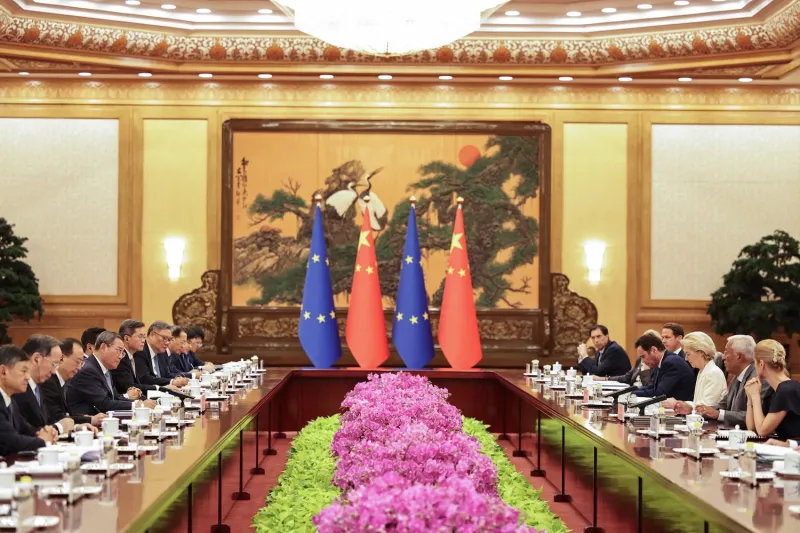Japan should heed fishing industry concerns about Fukushima radioactive water discharge plan
August 19 , 2023By David Morris, a non-resident Senior Fellow at the Center for China and Globalization(CCG).
■ The Pacific fishing industry, already stressed from climate change and illegal overfishing, does not need additional challenges.
■ As long as concerns remain about marine life and food safety, Tokyo should apply the precautionary principle it insists from others, like with genetically modified food.
 Demonstrators hold signs reading “No dumping” and “No to the sea, yes in the land” at a protest against Japan’s Fukushima waste water discharge plan, in Seoul, South Korea, on July 8. The proposal has also been criticised by China and is opposed by Japan’s fishing industry. Photo: Bloomberg
Demonstrators hold signs reading “No dumping” and “No to the sea, yes in the land” at a protest against Japan’s Fukushima waste water discharge plan, in Seoul, South Korea, on July 8. The proposal has also been criticised by China and is opposed by Japan’s fishing industry. Photo: Bloomberg
Japan, in planning to start discharging over a million tonnes of radioactive waste water into the Pacific soon, has turned a deaf ear to the concerns of the region’s fishing industry. Fishermen in the Pacific, already under pressure from climate change and overfishing, now face threats to their reputation for food safety.
The failure of the Fukushima nuclear power plant after a tsunami hit 12 years ago resulted in radioactive repercussions that will last for decades. The water used to cool the damaged nuclear reactors continues to accumulate, and is stored in huge tanks. Plant operator Tokyo Electric Power Company is set to release this waste water into the Pacific Ocean this year and continue for an estimated three decades at least.
Yet the Japanese government had reportedly promised not to do so unless it had stakeholder support. The fishing industry is not happy with the plan. The reputation of their catch is at stake. Consumers, not least in Japan, demand to know their seafood is safe and are increasingly aware of the environmental pressures on the region’s fishery resources.
There are concerns about the impact of the planned, slow release of radioactive waste water into the ocean on marine life and for consumers of affected seafood. When it comes to the safety and reputation of Japan’s food, perhaps the government should apply the precautionary principle that it insists from others.
I was a senior adviser to the Tasmanian government about 20 years ago when a letter arrived from the head of one of Japan’s major trading houses demanding that Tasmania certify that its agricultural products were free of genetically modified organisms (GMOs).
The reputation of Tasmania’s high-quality food exports was at stake, and the government took the then-controversial decision of applying the world’s first moratorium on GMOs. That decision was all about protecting market reputation.
The scientific advice was mixed but largely unconcerned, rather like the scientific advice today on the slow release of Fukushima’s waste water into the Pacific. Before the Fukushima nuclear accident, scientific opinion also considered that plant to be safe.
Industry stakeholders and citizens need to be reassured that their food supply is safe. If the fishing industry and its customers, not to mention regional countries, are not satisfied, then the Japanese government has more work to do, to consult and perhaps find an alternative solution.
Tasmania found that its precautionary stance on GMOs won it even greater international recognition for its pure and high-quality food. Japan, too, might find that a precautionary approach towards the release of its radioactive waste water would bolster its reputation as a good regional citizen.
Nuclear waste is a particularly sensitive issue in the Pacific. In the 20th century, the United States and France tested many nuclear weapons there, and the environmental and social consequences of the radioactive fallout linger to this day.
The Pacific island nations, united in their concerns about nuclear testing, have voiced worries about the ocean release of radioactive waste water from the Fukushima plant. Henry Puna, secretary general of the Pacific Islands Forum, has pointed to “serious information gaps” in Japan’s plan and called for it to be held off.
The fishing industry of the Pacific is already facing many challenges. Climate change is generating more natural disasters, irregular tides, higher sea levels and rising water temperatures, all of which affect both marine life and island communities. Threats to biodiversity may affect the entire ocean food chain over time.
Faced with such existential challenges, the leaders of the Pacific island nations have long been at the forefront of demands for greater global action to switch from polluting energy infrastructure and industries towards greener solutions.
Further, illegal and unregulated overfishing by vast numbers of rogue fishing boats is seriously depleting some fishery resources, with a severe impact on populations of bluefin and yellowfin tuna. Inadequate maritime surveillance and enforcement by the countries of the region have allowed this problem to fester for too long.
There is therefore much more that can be done to ensure the safety and sustainability of the Pacific fishing industry. Not only should the waters remain unpolluted but countries must do more to tackle the threat of climate change and illegal, unregulated overfishing.
For the developing countries of the Pacific, fishing is one of their most critical industries, providing much-needed foreign exchange and livelihoods for many in the island communities.
For the large consumer markets for seafood in the major economies of the region, the safety and sustainability of seafood are questions of growing concern, and food security will be an issue of increasing concern.
The fishing industry needs a greater voice – and that voice must be heard. Japan, for a start, could begin to listen. A precautionary approach to the Fukushima waste water disposal would be a valuable step in the right direction.
From SCMP, 2023-8-19
Topical News See more







